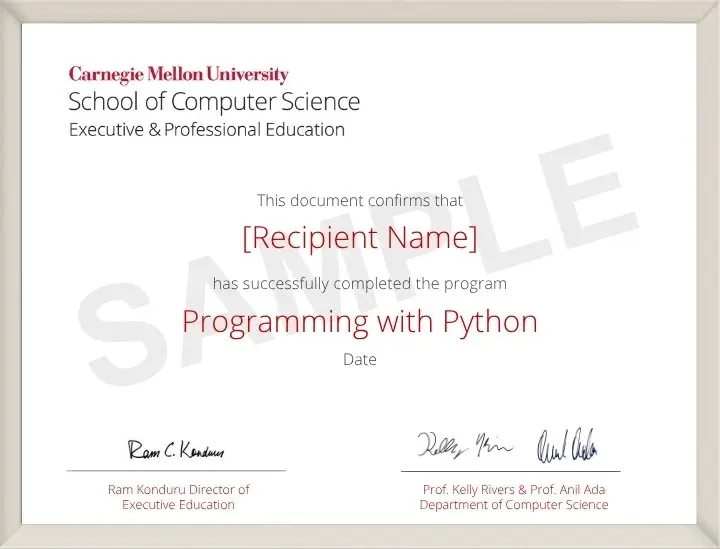
Programming with Python
Accelerate Your Career with In-Demand Python Programming Skills
Python is one of the most in-demand programming languages across industries, powering applications in software development, data science, AI, fintech, healthcare, and more. Python's simple syntax, rich open-source libraries, and cross-platform compatibility make it a preferred language for organizations building scalable, data-driven solutions. It enables professionals to automate processes and solve real-world problems, making Python programming a strategic business skill and a catalyst for career growth.
The 10-week Programming with Python online program from the Carnegie Mellon School of Computer Science Executive Education is designed for participants at all levels to build practical coding skills using a versatile programming language. Developed by the world's first school of computer science, it covers basic concepts, algorithmic thinking, debugging, and key Python reference libraries. Through hands-on exercises and a capstone project, you will learn to write clean, efficient Python code and apply it to solve real-world problems across domains such as language processing, genetics, and social media, laying the foundation for advanced work in data science and machine learning.
Top 3
#1
2.9×
Key Outcomes
Python’s scope is nearly limitless. Data scientists, engineers, and developers are flocking to Python because it is versatile for applications ranging from web development to data science and from artificial intelligence to cybersecurity. In this program, you will learn the essentials of Python coding*:
Identify, interpret, and apply core programming building blocks in Python code
Use algorithmic thinking to break up problems into smaller pieces and solve each piece individually
Recognize and apply best industry practices for programming
Interpret, use, and build on existing code and Python libraries
*Note: No prior programming knowledge is required.
Program Modules
Designed as an online program focused on writing code using common structures in the Python programming language, content is shared via recorded faculty videos and live office hours with learning facilitators.
Capstone Project
As part of the capstone project, you will choose from one of three project options that use Python code to accomplish tasks in different domains.
Linguistic Analysis of Text: Build and test your own language model to analyze and mimic the works of famous authors: Hans Christian Andersen and the Brothers Grimm
Comparison of DNA: Use data analysis to process and analyze DNA sequences in humans and elephants for the cancer-suppressing p53 gene
Data Analysis of Social Media Posts: Analyze a data set that maps social media posts to collect information about the text's bias, partisanship, and message intent
These hands-on projects demonstrate Python's versatility and help you build practical, problem-solving skills.
Simulation Exercises
Hands-on practice is a core part of the program. Every new concept taught is paired with guided practice, allowing you to apply new techniques and learn in a live coding environment. Throughout the program, you will gain practical coding experience using Codio, an interactive platform designed for effortless technical learning. All practice exercises, from basic techniques to the final capstone project, are completed in Codio. You can write, test, and debug Python code directly on your browser and receive auto-graded assessments, instant feedback, and instructional tools to help you through exercises.
Program Experience

Office Hours with Learning Facilitators

Demonstrations

Coding Exercises in Each Module

Bite-Sized Learning

Knowledge Checks

Dedicated Program Support Team

Mobile Learning App

Peer Discussion

Capstone Project

Bonus Content on Advanced Topics
Why Python?
Python is a good starting point for first-time coders. It uses simple, natural language syntax, almost like spoken English. It is powerful and it is versatile, favored by such diverse industry giants as Netflix, PayPal, NASA, Disney, and Dropbox. Python is used by 87% of data scientists.
User-Friendly Syntax: As an interpreted language, Python has simpler, more concise syntax than Java. Python's simple, concise syntax makes it easy to write algorithms with just a few lines of code
Open-Source Libraries: Pre-written code is readily available, with algorithms at your disposal, so you do not have to start every project from scratch. You can benefit from highly specific libraries – physics, web development, gaming, machine learning – by simply importing algorithms and applying them to your own data. It is plug and play at its best, with new functionalities being added all the time
Community Exchanges: Python’s popularity means it has great community support, with almost 8 million Python developers across the world to help you debug or resolve a programming challenge
Compatibility: Python is a cross-platform language and can be integrated easily with Windows and other platforms
Adaptability: Almost every field is adopting Python and needs both generalists and specialists who know how to use it. Fields as varied as gaming, web development, healthcare, and fintech prefer Python over other programming languages, making it the must-learn language for STEM professionals and data scientists
sources: generalassemb.ly
Who Should Enroll?
This online program is designed for anyone interested in acquiring a basic understanding of Python programming. No prior programming knowledge is required. The program is particularly suitable for:
Early-career IT professionals who need structured training in Python programming to write efficient Python code, grow into more technical roles, and stay competitive in a technology-driven job market
Professionals from non-IT backgrounds who are working in digital or tech-enabled environments who want to learn Python to streamline tasks, automate workflows, and build digital tools that support their core functions
Individuals returning to the workforce, such as military veterans or professionals resuming their careers after a break, who want to gain new, marketable skills in a language widely used in software development, data science, and machine learning
Self-taught or informally trained programmers who have basic familiarity with coding and are now seeking structured, formal training in Python programming to support independent projects, process automation, or digital solution development
Professionals from non-technical roles who want to explore coding as a strategic advantage — whether to prototype new ideas, improve decision making through technical fluency, or simply stay ahead in a digital-first economy
High school and college students from both computer science and non-computer science backgrounds who want to build a strong foundation in Python
Participant Testimonials
Program Faculty

Assistant Teaching Professor, School of Computer Science, Carnegie Mellon University
An assistant teaching professor in the School of Computer Science, Kelly Rivers teaches introductory programming, including the “Principles of Computing,” “Fundamentals of Pro...

Associate Teaching Professor, School of Computer Science, Carnegie Mellon University
Anil Ada is an expert in theoretical computer science, teaching “Fundamentals of Programming and Computer Science” and “Great Ideas in Theoretical Computer Science” as an asso...

Certificate
Upon successful completion of the program, participants will receive a verified digital certificate of completion from Carnegie Mellon University’s School of Computer Science Executive Education. This is a training program and it is not eligible for academic credit.
Your digital certificate will be issued in your legal name and emailed to you at no additional cost, upon completion of the program, as per the stipulated requirements. All certificate images are for illustrative purposes only and may be subject to change at the discretion of Carnegie Mellon University’s School of Computer Science Executive Education.
The Carnegie Mellon School of Computer Science Executive Education learning experience
At Carnegie Mellon’s Executive Education Program in the School of Computer Science, we provide organizations and people access to the skills and tools necessary to solve real world technical problems by equipping the next generation of technology leaders with the experience, insights and novel solutions developed by our community of computer science experts. From custom training programs to online individualized learning, our cutting-edge programming — backed by faculty who pioneered the field — takes your skillset to the next level, giving you the tools to tackle your company’s next great technological challenge.
FAQs
Didn't find what you were looking for? Write to us at learner.success@emeritus.org or Schedule a call with one of our Program Advisors or call us at +1 315 756 3771 (US) / +44 203 835 5826 (UK) / +65 3138 2533 (SG)
Flexible payment options available.
Starts On
